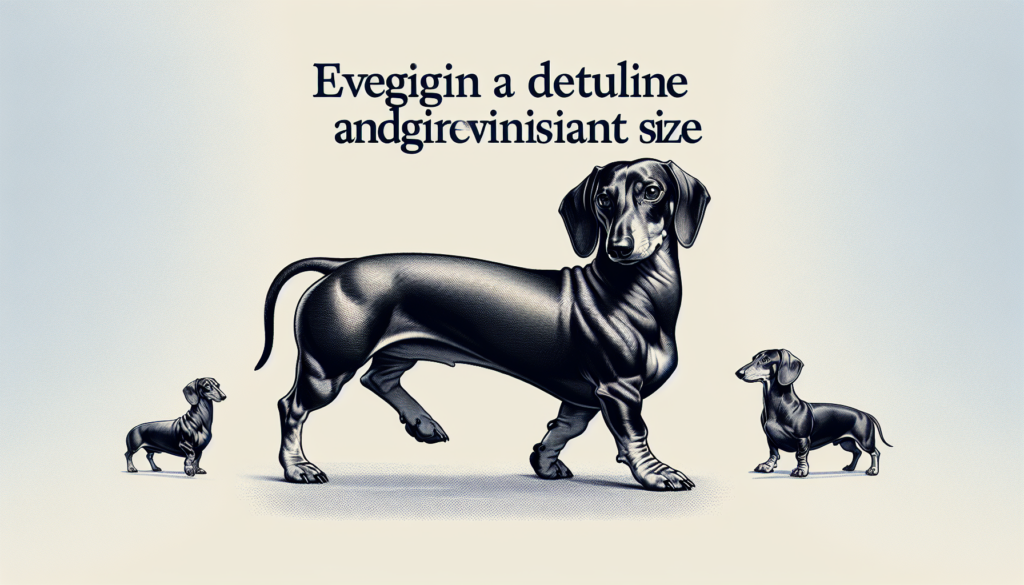Have you ever wondered about the size and weight of Dachshunds? Well, look no further! In this article, we’ll explore the fascinating world of Dachshunds and provide you with all the essential information you need to know about their size and weight. Whether you’re a current Dachshund owner or considering adopting one, understanding their size and weight can help you better care for these adorable pups. So, let’s jump right in and discover everything you need to know about Dachshund size and weight!
Dachshund Size And Weight

Overview
Dachshunds are a popular breed known for their unique long body and short legs. They come in three different sizes: standard, miniature, and toy. Each size has its own set of characteristics and weight range. Understanding the size and weight of a Dachshund is important for both potential owners and existing ones. In this article, we will explore each size category, the factors that affect their size and weight, common issues related to size and weight, and tips for maintaining a healthy size for your Dachshund.
Standard Dachshund Size And Weight
The standard Dachshund is the largest of the three sizes, typically weighing between 16 to 32 pounds (7 to 14 kilograms). They generally have a height of 8 to 9 inches (20 to 23 centimeters) at the shoulder. Standard Dachshunds have a robust build and are often considered the original size of the breed. They are well-suited for active families and enjoy outdoor activities such as hiking and running.
Miniature Dachshund Size And Weight
The miniature Dachshund is smaller in size compared to the standard variety. They typically weigh between 8 to 11 pounds (3.5 to 5 kilograms) and have a height of 5 to 7 inches (13 to 18 centimeters) at the shoulder. Miniature Dachshunds are popular due to their adorable appearance and compact size, making them a great choice for individuals living in apartments or smaller homes. They are affectionate and enjoy spending time indoors with their owners.
Toy Dachshund Size And Weight
The toy Dachshund is the smallest of the three sizes. They usually weigh around 6 pounds (2.5 kilograms) or less, and their height can range from 4 to 5 inches (10 to 13 centimeters) at the shoulder. Toy Dachshunds are incredibly tiny and fragile, requiring careful handling. They are often preferred by people looking for a companion that can easily fit in their lap or carry them around. Their diminutive size also makes them suitable for households with limited space.

Factors Affecting Dachshund Size And Weight
Several factors can influence the size and weight of a Dachshund. Genetics play a significant role, as certain bloodlines may have a tendency to produce larger or smaller dogs. Nutrition also plays a crucial role in a Dachshund’s growth, with a well-balanced diet contributing to healthy weight gain. Additionally, exercise and physical activity levels impact a Dachshund’s weight, with regular exercise helping to maintain a healthy size.
Size And Weight Chart
To help Dachshund owners understand the range of sizes and weights within each category, here is a size and weight chart:
| Size Category | Weight Range (pounds) | Height Range (inches) |
|---|---|---|
| Standard | 16 – 32 | 8 – 9 |
| Miniature | 8 – 11 | 5 – 7 |
| Toy | 6 or less | 4 – 5 |
It is important to note that these ranges are approximate and individual Dachshunds may vary slightly.
Maintaining a Healthy Size And Weight
To ensure your Dachshund maintains a healthy size and weight, it is necessary to provide them with a balanced diet suitable for their age and size. Consult with your veterinarian to determine the appropriate amount of food and the best type of diet for your Dachshund. Regular exercise is also crucial to prevent excessive weight gain and maintain overall fitness. Engage your Dachshund in activities that match their size and energy level, such as short walks or interactive play sessions.
Common Size And Weight-Related Issues
While Dachshunds are generally healthy dogs, certain size and weight-related issues are common in the breed. Their long backs and short legs make them prone to spinal issues and back problems, such as intervertebral disc disease. Extra weight can exacerbate these conditions, so it is essential to monitor your Dachshund’s weight and avoid excessive feeding. Regular visits to the veterinarian for check-ups can help identify any potential issues early on and prevent them from worsening.
Breeding Considerations
Breeding Dachshunds should be approached with care, considering the potential impact on their size and weight. Breeding two dogs of the same size category typically produces offspring within that category. However, it is essential to consider the health and conformation of the parents to avoid passing on genetic issues related to size and weight. Consulting with a reputable breeder or a veterinarian experienced in Dachshund breeding is recommended to ensure responsible and ethical breeding practices.
Conclusion
Understanding the size and weight variations within the Dachshund breed is essential for both potential owners and existing ones. Whether you prefer the standard, miniature, or toy variety, each size category has its own unique traits and requirements. By providing a balanced diet, regular exercise, and proper veterinary care, you can help your Dachshund maintain a healthy size and weight, promoting their overall well-being and longevity. Remember to consult with professionals for specific advice tailored to your Dachshund’s individual needs.
